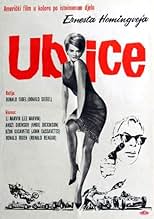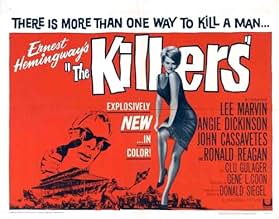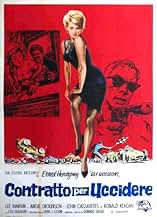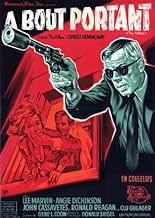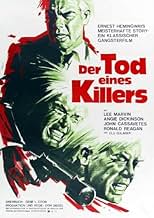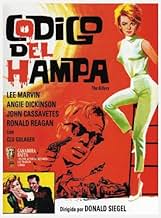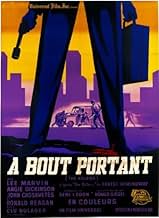Surprised that their contract victim didn't try to run away from them, two professional hit men try to find out who hired them and why.Surprised that their contract victim didn't try to run away from them, two professional hit men try to find out who hired them and why.Surprised that their contract victim didn't try to run away from them, two professional hit men try to find out who hired them and why.
- Won 1 BAFTA Award
- 1 win & 1 nomination total
Irvin Mosley Jr.
- Mail Truck Guard
- (as Irvin Mosley)
- Director
- Writers
- All cast & crew
- Production, box office & more at IMDbPro
Featured reviews
Lee Marvin and Clu Gulager, two contract killers, walk into a Midwest school for the blind and cold-bloodedly murder John Cassavettes. "We walk in, we put him down, we walk out," muses Marvin distractedly on the train back to Chicago. Cassavettes had the chance to run but didn't, and Marvin wants to know why.
Initially, Don Siegel's colour remake of the Ernest Hemingway story was intended as the first made-for-TV movie. Vetoed by the network for its amoral viewpoint and violence, it was released in cinemas and quickly became a cult 1960s B-movie.
Anonymous and menacing in executive suits, sunglasses and briefcase, Marvin and scene-stealing Gulager memorably personify organised crime under Siegel's expert direction. They're pure all-American evil.
True, the main plot - pieced together in flashback as the two hitmen track down the mail robbery gang led by Ronald Reagan (his last film) - is pretty routine stuff. But even that serves to heighten the threat represented by Marvin and Gulager, as they unravel the real reason for Cassavettes' deathwish.
"No one ever knows what we're talking about," mocks Gulager when femme fatale Angie Dickinson tries to act dumb. The scene in the hotelroom where the killers force her to tell is handled with a ferocious cool that is Siegel's trademark.
The Killers was still in production when Kennedy was assassinated - perhaps one reason, given its theme, why TV network ABC pulled it from their 1964 schedule. The scene where Gulager is shot down on a sunlit sidewalk even echoed the killing of Kennedy assassin Lee Harvey Oswald (Gulager's character is called Lee).
OK, it's not a masterpiece. Even the great Don Siegel can't quite disguise a B-movie budget, a repetitious screenplay, brightly artificial colour, and exteriors that are only too obviously the Universal backlot. But it is tense and exciting, thanks to Siegel's authoritative grasp of the genre.
"I shot it in the style which I think is my style at its best," Siegel concluded later. "Very taut and lean with great economy. If I had to do it over again, I don't think I would change much."
Initially, Don Siegel's colour remake of the Ernest Hemingway story was intended as the first made-for-TV movie. Vetoed by the network for its amoral viewpoint and violence, it was released in cinemas and quickly became a cult 1960s B-movie.
Anonymous and menacing in executive suits, sunglasses and briefcase, Marvin and scene-stealing Gulager memorably personify organised crime under Siegel's expert direction. They're pure all-American evil.
True, the main plot - pieced together in flashback as the two hitmen track down the mail robbery gang led by Ronald Reagan (his last film) - is pretty routine stuff. But even that serves to heighten the threat represented by Marvin and Gulager, as they unravel the real reason for Cassavettes' deathwish.
"No one ever knows what we're talking about," mocks Gulager when femme fatale Angie Dickinson tries to act dumb. The scene in the hotelroom where the killers force her to tell is handled with a ferocious cool that is Siegel's trademark.
The Killers was still in production when Kennedy was assassinated - perhaps one reason, given its theme, why TV network ABC pulled it from their 1964 schedule. The scene where Gulager is shot down on a sunlit sidewalk even echoed the killing of Kennedy assassin Lee Harvey Oswald (Gulager's character is called Lee).
OK, it's not a masterpiece. Even the great Don Siegel can't quite disguise a B-movie budget, a repetitious screenplay, brightly artificial colour, and exteriors that are only too obviously the Universal backlot. But it is tense and exciting, thanks to Siegel's authoritative grasp of the genre.
"I shot it in the style which I think is my style at its best," Siegel concluded later. "Very taut and lean with great economy. If I had to do it over again, I don't think I would change much."
The Killers is directed by Don Siegel and adapted to screenplay by Gene L. Coon from the short story written by Ernest Hemmingway. It stars Lee Marvin, Angie Dickinson, Clu Gulager, John Cassavetes, Ronald Reagan and Claude Akins. Music is by John Williams and cinematography by Richard L. Rawlings.
Hit men Charlie (Marvin) and Lee (Gulager) enter a school for the blind and gun down motor mechanic teacher Johnny North (Cassavetes). He doesn't resist. Why? This question bothers Charlie and he sets about finding out...
It's difficult when reading the name The Killers to not think of the 1946 film made by Robert Siodmak, a film that is revered as one of the quintessential movies of film noir. But Don Siegel's film, a re-jigging of the plot, is well worthy of consideration as quintessential neo-noir.
Originally slated to be the first made for TV movie as part of a new era for movies on television, the film was pulled by NBC for being too violent. With the film also featuring a murder by sniper scene, the recent assassination of John F. Kennedy by sniper ensured The Killers was temporarily on unsafe ground. With Ronald Reagan making his last appearance on film before moving into politics, unusually playing a villain no less, the 64 version of The Killers has a bit of history.
It's a film about double-crossing, murder and fateful yearnings, featuring amoral characters in a wonderfully constructed story that is told in flashbacks! Photographed in bright, almost garish, colours, it's very much the polar opposite to Siodmak's version, well visually at least, but it is very effective and striking, almost enhancing the lurid nature of Coon's screenplay. It's an aggressive film where the violence packs a punch, and the ending has a considerable black heart.
The cast are mostly effective. Marvin and Gulager's hit-man pairing are deliberately off kilter in terms of personality, and it's these two that propel the movie forward (well backwards really). Cassavetes makes interesting work as live wire dupe Johnny, Akins does good as a pal watching on helplessly as Johnny loses his life footings and Dickinson sizzles as she fatalises the femme. Weak link is Reagan, who looks ill at ease playing a tough villain type. It's no surprise to learn later on down the line that he wasn't very fond of the role.
Good quality neo-noir crafted by a man who knew how to do the real deal back in the day. 7.5/10
Hit men Charlie (Marvin) and Lee (Gulager) enter a school for the blind and gun down motor mechanic teacher Johnny North (Cassavetes). He doesn't resist. Why? This question bothers Charlie and he sets about finding out...
It's difficult when reading the name The Killers to not think of the 1946 film made by Robert Siodmak, a film that is revered as one of the quintessential movies of film noir. But Don Siegel's film, a re-jigging of the plot, is well worthy of consideration as quintessential neo-noir.
Originally slated to be the first made for TV movie as part of a new era for movies on television, the film was pulled by NBC for being too violent. With the film also featuring a murder by sniper scene, the recent assassination of John F. Kennedy by sniper ensured The Killers was temporarily on unsafe ground. With Ronald Reagan making his last appearance on film before moving into politics, unusually playing a villain no less, the 64 version of The Killers has a bit of history.
It's a film about double-crossing, murder and fateful yearnings, featuring amoral characters in a wonderfully constructed story that is told in flashbacks! Photographed in bright, almost garish, colours, it's very much the polar opposite to Siodmak's version, well visually at least, but it is very effective and striking, almost enhancing the lurid nature of Coon's screenplay. It's an aggressive film where the violence packs a punch, and the ending has a considerable black heart.
The cast are mostly effective. Marvin and Gulager's hit-man pairing are deliberately off kilter in terms of personality, and it's these two that propel the movie forward (well backwards really). Cassavetes makes interesting work as live wire dupe Johnny, Akins does good as a pal watching on helplessly as Johnny loses his life footings and Dickinson sizzles as she fatalises the femme. Weak link is Reagan, who looks ill at ease playing a tough villain type. It's no surprise to learn later on down the line that he wasn't very fond of the role.
Good quality neo-noir crafted by a man who knew how to do the real deal back in the day. 7.5/10
I recently saw this at the 2008 Palm Springs Film Noir Festival. Not really Film Noir as it was made after the genre had passed and is in color and features no detectives or private eyes and not even a film as it was originally intended as the very first made-for-television movie. Produced by Universal's Revue Studios it was deemed too violent for television. It of course isn't too violent by today's standards and NBC censors did call for revisions of the movie and since there are only a few questionable scenes It could have been easily done but they left it as was and it didn't make it's May of 1964 television premier. Instead it went to theaters and drive ins in July of 1964. Long-time film and television director Don Siegel directs. His most noted work would still come late in his career with Clint Eastwood in "Coogan's Bluff", "Two Mules for Sister Sara", "The Beguiled", "Dirty Harry" and "Escape From Acatraz" and John Wayne in "The Shootist" and Charles Bronson in "Telefon." This film is as different from the 1946 film as that film is as different from the short story by Earnest Hemingway that both film borrow from. The 1946 film is noted for being Burt Lancaster's first film role and the 1964 film is noted for being Ronald Reagan's last film role. Seasoned hit-man Charlie Storm (Lee Marvin) and young enforcer sidekick Lee (Clu Gulager) have been hired for larger than usual fee to knock off a retired professional race car driver who now teaches shop class in a school for the blind. A series of flashbacks tell the story of Johnny North (John Cassavetes) and his mechanic Earl Sylvester (Claude Akins) and the femme fatale Sheila Farr (Angie Dickenson) who comes into their lives. Sheila is the kept woman of mobster Jack Browning (Ronald Reagan) whose gang includes Mickey Farmer (Norma Fell) and George Flemming (Robert Phillips). Also in the cast are a couple of familiar and wonderful character television actors in small support roles with Kathleen O'Malley and Burt Mustin. Music score by John Williams when he was a contract composer before he made it big the film also features a Henry Mancini song "Too Little Time" with an on screen performance by jazz singer Nancy Wilson. Screenplay adaptation by Gene L. Cook and director Siegel this deserves a look especially from it's great cast and historical perspective. It keeps flowing pretty smoothly and never bogs down. Cassavetes seems uncomfortable in the role and their really isn't much on screen chemistry between he and Dickenson but Dickenson is delicious as the femme fatale and Marvin and Gulager, especially Gulager's smooth wit, are great as the hit team. Angie Dickenson was on hand at the screening for an audience Q&A following the film and it was great to see her. I liked this and would give this an 7.5 out of 10.
I haven't seen Robert Siodmark's 1946 original, but since it's generally accepted to be better than this version; I sure want to see it! Second best, this may be, but that's certainly not to say that this isn't an excellent flick. Lee Marvin steps into the role of a hit-man brilliantly, and his no-nonsense performance really makes the film. He is joined by Clu Gulager as his fellow hit-man and partner into an investigation that comes about through Marvin as he wonders why he was paid so much to kill a former race car driver, who also didn't run away when he had the chance. What follows is a tour de force of gangster pulp fiction as the two hit men pay little visits to the various players in the plot behind the assassination they were contracted to commit. The style of the movie is delicious, and watching these two men stroll around coolly in their expensive suits while interrogating their various victims is a treat indeed. Several modern films, Pulp Fiction most obviously, have taken a lot of influence from this flick and it's always good to know where that influence came from.
The central pairing of Lee Marvin and Clu Gulager is what made the film for me. The way that they populate their scenes is excellent, with one of them doing the talking and the other fiddling around in the background. The way that this is orchestrated gives away a very understated coolness, which the film is always keen to capitalise on. The pair's chemistry is more to do with the style and how they look together than how they interact with each other; and that is right on cue. The Killers also benefits from an excellent support cast, which includes the likes of Ronald Reagan, Angie Dickinson and John Cassavetes. This film can't be considered noir because it's in colour, but this is about as close as you can get to the style without actually being a part of it. The film that it was based on was film noir, and this remake has managed to retain the foundations, even if it has lost the dark picture. On the whole, The Killers is an excellent picture and while what some people say about it being second to the original may be withstanding; I say this is an excellent flick in it's own right.
The central pairing of Lee Marvin and Clu Gulager is what made the film for me. The way that they populate their scenes is excellent, with one of them doing the talking and the other fiddling around in the background. The way that this is orchestrated gives away a very understated coolness, which the film is always keen to capitalise on. The pair's chemistry is more to do with the style and how they look together than how they interact with each other; and that is right on cue. The Killers also benefits from an excellent support cast, which includes the likes of Ronald Reagan, Angie Dickinson and John Cassavetes. This film can't be considered noir because it's in colour, but this is about as close as you can get to the style without actually being a part of it. The film that it was based on was film noir, and this remake has managed to retain the foundations, even if it has lost the dark picture. On the whole, The Killers is an excellent picture and while what some people say about it being second to the original may be withstanding; I say this is an excellent flick in it's own right.
Don Siegel's 'The Killers' is a diamond in the rough! Initially filmed for television, its technical limitations are easily overlooked as they are more than compensated for by the drive of the no-nonsense narrative, and the high standards of the acting. Caught somewhere between Kubrick's 'The Killing' and Boorman's 'Point Blank', it may not be as flamboyantly impressive as either, but it is just as memorable in its own low key way.
Quentin Tarantino has admitted that the structure of 'The Killing' has influenced him, but after watching 'The Killers', one must question whether this movie is also high on his list. Especially as the cooler-than-thou hit-men played by Lee Marvin and Clu Gulager almost anticipate Travolta and Jackson's similarly quirky ones in 'Pulp Fiction' thirty years later. Just like Vincent and Jules, Charlie and Lee are eccentric and likable when "off duty" and brutal sociopaths when on. Lee Marvin is one of Hollywood's legendary screen tough guys, and his performance here is as good as any he ever did, but the real stand out for me is Clu Gulager's health nut contract killer. He just about steals every scene he is in. Up to this point he was mainly known as a Western TV star. Why this role didn't launch him into a Bruce Dern/Harry Dean Stanton/Dick Miller style career baffles me. Instead he was mainly consigned to the "made for TV" wasteland, and never got the breaks his talent deserved.
Marvin and Gulager's star turns are backed up by strong supporting performances from John Cassavetes, as their enigmatic "job", Angie Dickinson, a double-crossing femme fatale, and Ronald Reagan in a surprising turn as a nasty gangster. Also keep an eye out for a dialogue-free cameo by a very young looking Seymour Cassel!
'The Killers' looks better and better as the years go by. Not without flaws, sure, and calling it a masterpiece would be overkill, but it's a movie that was ahead of it's time in many ways, and it can't help but impress discerning fans of 50s/60s b-grade crime movies, film noir, or Sam Fuller.
Quentin Tarantino has admitted that the structure of 'The Killing' has influenced him, but after watching 'The Killers', one must question whether this movie is also high on his list. Especially as the cooler-than-thou hit-men played by Lee Marvin and Clu Gulager almost anticipate Travolta and Jackson's similarly quirky ones in 'Pulp Fiction' thirty years later. Just like Vincent and Jules, Charlie and Lee are eccentric and likable when "off duty" and brutal sociopaths when on. Lee Marvin is one of Hollywood's legendary screen tough guys, and his performance here is as good as any he ever did, but the real stand out for me is Clu Gulager's health nut contract killer. He just about steals every scene he is in. Up to this point he was mainly known as a Western TV star. Why this role didn't launch him into a Bruce Dern/Harry Dean Stanton/Dick Miller style career baffles me. Instead he was mainly consigned to the "made for TV" wasteland, and never got the breaks his talent deserved.
Marvin and Gulager's star turns are backed up by strong supporting performances from John Cassavetes, as their enigmatic "job", Angie Dickinson, a double-crossing femme fatale, and Ronald Reagan in a surprising turn as a nasty gangster. Also keep an eye out for a dialogue-free cameo by a very young looking Seymour Cassel!
'The Killers' looks better and better as the years go by. Not without flaws, sure, and calling it a masterpiece would be overkill, but it's a movie that was ahead of it's time in many ways, and it can't help but impress discerning fans of 50s/60s b-grade crime movies, film noir, or Sam Fuller.
Did you know
- TriviaAccording to Don Siegel, it was the policy at Universal at the time to shoot the last scene of the film first. On that first day of filming, according to Siegel and Clu Gulager, Lee Marvin arrived late and had been drinking, but because he had no dialogue, the scenes were used as shot.
- GoofsAt the start of the race, Johnny presses the accelerator to the floorboard with his right foot. However, his left foot is nowhere near the clutch. In a manual transmission, the clutch would need to be released while simultaneously accelerating.
- Quotes
Charlie Strom: Lady, I don't have the time.
- Crazy creditsThe style of the film's credits reflects its original made-for-TV origins: in 1960s TV movies, Stars, Co-stars, and Featured Players were listed only in the opening credits, while supporting players were listed only in the closing credits.
- ConnectionsFeatured in Biography: Angie Dickinson: Tinseltown's Classiest Broad (1999)
- SoundtracksToo Little Time
Music by Henry Mancini
Lyrics by Don Raye
Sung by Nancy Wilson
[Johnny and Sheila dance to the song performed at the nightclub]
Details
Box office
- Budget
- $750,000 (estimated)
- Gross worldwide
- $9,261
- Runtime
- 1h 33m(93 min)
- Color
- Aspect ratio
- 1.85 : 1
Contribute to this page
Suggest an edit or add missing content


